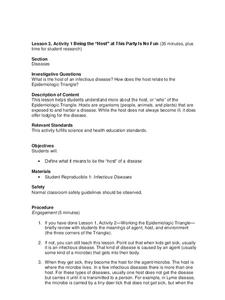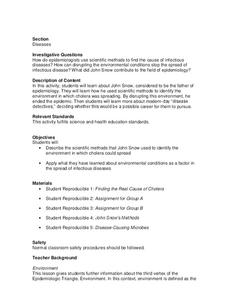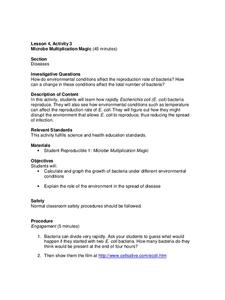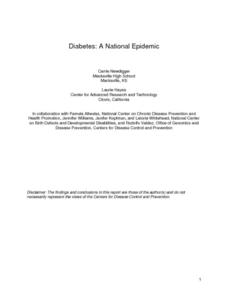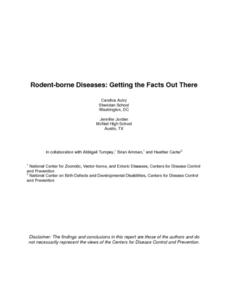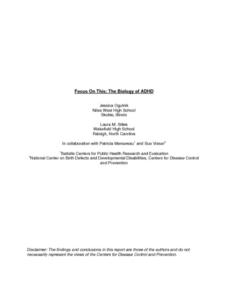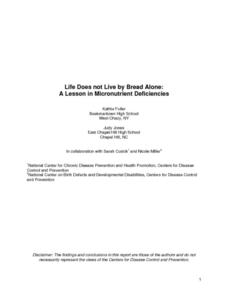Agency for Toxic Substances and Disease Registry
Don't Mess with Mercury (Lesson A)
Mercury is the only metal that is a liquid at room temperature. Teach your class this and many more interesting mercury facts by assigning an engaging task. A public relations activity, the exercise informs pupils of the hazards of...
Curated OER
Why Can’t I Have Sugar? All About Diabetes
Begin the lesson plan by having your class write what they know about diabetes. They learn through a skit how the body metabolizes glucose. A visual representation of the two types of diabetes is displayed, and then learners participate...
Centers for Disease Control and Prevention
Understanding the Epidemiologic Triangle through Infectious Disease
Introduce infectious diseases and the epidemiologic triangle. A helpful resource describes the agent, host, and environment from the three vertices as well as the time factor, which is in the middle. Scholars complete a simple...
Centers for Disease Control and Prevention
Being the “Host” at This Party is No Fun
Discuss the symptoms and variations from infectious diseases from one person to the next. After a class discussion, small groups complete research on the topic.
Centers for Disease Control and Prevention
Diseases
During a cholera outbreak, scientists presented two theories; one theory was based on miasma and the other on germs and contaminated water. The lesson looks at the scientific process for finding the real culprit.
Centers for Disease Control and Prevention
Microbe Multiplication Magic
A instructional activity introduces the reproduction rate of E. coli though a video. Then scholars complete a data table and graph of reproduction rates in ideal conditions as well as less than ideal conditions.
Curated OER
Eat Smart. Play Hard.
Students study healthy food choices and the energy it creates for physical activity. In this food energy lesson, students complete multiple activities to learn about the benefits of healthy eating upon physical activity.
Curated OER
Malaria: The Solution
Students discover that malaria can be controlled and even stopped. They break into six teams to research one of the five elements of the comprehensive approach using the Internet. They then present their findings to the class in a form...
Curated OER
Protect the Skin You're in
Students explore the importance of sun safety in relationship to skin cancer prevention. They test the effectiveness of various sunscreens and administer and analyze a simple survey to their peers. In addition, they implement a public...
Curated OER
Environmental Awareness — Think Global, Act Local
Students identify the different hazardous wastes and the dangers they post to the environment. In this physical science lesson, students brainstorm ways to dispose them properly. They create a short story, song or poem to conclude the...
Curated OER
Diabetes: A National Epidemic
Students investigate the disease of diabetes. They observe research results to graph the trends of diabetes to contribute to the problem of being overweight. They explain in class discussion the physiological changes that occur in the...
Curated OER
UV: Use Caution
High schoolers investigate the concept of skin cancer and its relation to using tanning beds that expose people to artificial ultraviolet rays. They research the effects and look for ways to prevent the onset of skin cancer from the...
Curated OER
Autism Spectrum Disorders: The New Rainbow
Students conduct research into the area of Autism Spectrum Disorders. They use the internet and a variety of resources in order to obtain information. Students use the information to take part in a writing project of authoring a new...
Curated OER
Alzheimer's Disease
Investigate Alzheimer's disease. Conduct research using a variety of resources, obtain information, and input the data into a Microsoft Excel spreadsheet. Identify trends in the data and categorize them for an audience.
Curated OER
Rodent-borne Diseases: Getting the Facts Out There
Students conduct research of the hantavirus pulmonary syndrome (HPS) or lymphocytic choriomeningitis (LCMV). They obtain the information and create a public announcement in the form of a brochure, newsletter, poster, radio announcement,...
Curated OER
The Aging Brain: A Lesson on Alzheimer's Disease
Students investigate the aging brain and its relationship to the occurrence of Alzheimer's disease. They need to have prior knowledge of brain and nervous system anatomy in order to participate in this lesson. Students compare an aging...
Curated OER
The Biology of ADHD
Students investigate the biology of ADHD and its implications upon the formation and treatment of the disease. They draw and label the parts of a neuron. Also, they describe the neurotransmission cycle. Students create a list of pros and...
Curated OER
Life Does Not Live By Bread Alone
Learners investigate the relationship between micronutrients and proper metabolic function. The lesson should serve as an introduction to the subject. The subject of the function includes the study of plants, animals, and humans. They...
Baylor College
Activity and Exercise
Leave it to the classic jump rope to get your class excited about physical activity! Your class will begin by discussing the benefits of jumping rope as a form of exercise and learning a few different types of jumps. Then in groups of...
Nemours KidsHealth
Human Body Series - The Five Senses
Get your class up and moving with these engaging hands-on-activities that target their five senses. Children explore four different work stations that require them to look, smell, hear, touch, and taste as they record their responses...
Baylor College
Calculating Exponential Growth
There can be a steep learning curve when teaching about exponential growth, but the lesson helps kids make sense out of the concept. When talking about exponential growth of viruses, learners may not be very interested, but when you are...
Baylor College
Modeling an HIV Particle
Models are an important part of science; they help us see the world on a scale that works for us. In the first of five lessons on HIV, learners make a paper model of the HIV virus that is about 500,000 times larger than the actual virus....
Baylor College
HIV/AIDS in the United States
In the final of five lessons about HIV/AIDS, groups create presentations to share data about the infection rates in the United States, examining demographic and geographic trends over the past ten years. Depending on how much time you...
Curated OER
Understanding the Steps in a Process
Students read, "Center for Drug Evaluation and Research: FAQs", and discuss with questions embedded in the lesson.





